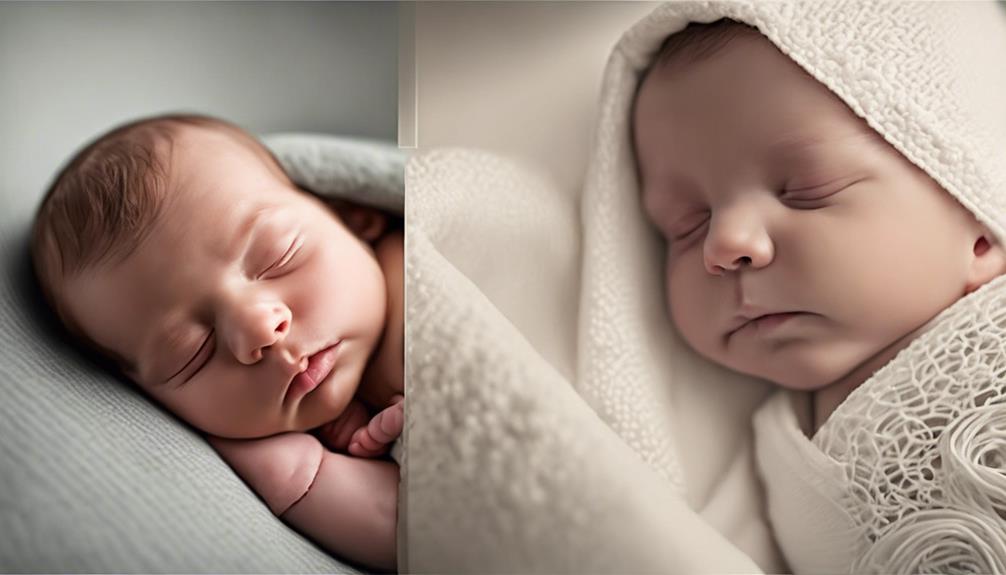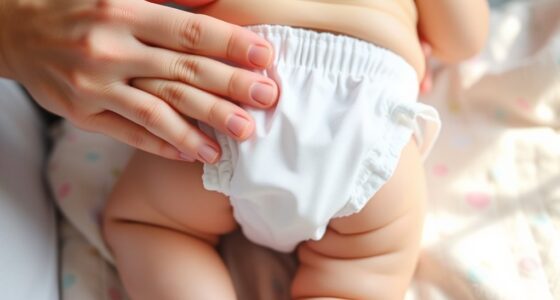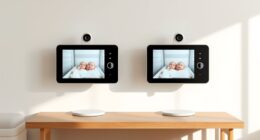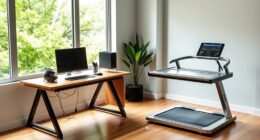If you've ever wondered how to calm your newborn's hiccups after a nursing session, there are effective ways you can try to ease their discomfort.
From gentle burping techniques to adjusting feeding positions, these methods can provide assurance for your little one.
Stay tuned to discover the best ways to soothe your baby's hiccups and guarantee a peaceful post-feeding experience for both of you.
Key Takeaways
- Burping techniques help release trapped air and minimize hiccups.
- Holding baby upright reduces diaphragm pressure and provides relief.
- Pacifiers offer comfort, regulate breathing, and relax the diaphragm.
- Adjust feeding techniques to reduce air intake and prevent hiccups.
Gentle Burping Techniques
If your newborn is experiencing hiccups after nursing, mastering gentle burping techniques can guarantee relief and comfort. Burping is crucial as it helps release trapped air in your baby's stomach, preventing hiccups.
To effectively burp your little one, try patting or rubbing their back gently while holding them in an upright position. This position aids in gas release, soothing your baby and reducing hiccups. Remember to provide adequate support to your baby's chin and chest while burping to encourage the release of gas.
Stay calm and relaxed during the burping process to prevent startling your baby and potentially triggering more hiccups. Consistent burping after nursing sessions can help maintain your baby's comfort and minimize the occurrence of hiccups.
Comforting Holding Positions

When comforting your newborn after nursing, consider adopting different holding positions to help alleviate hiccups and make sure their comfort. Holding your baby in an upright position can be beneficial as it reduces pressure on the diaphragm, potentially aiding in stopping hiccups. Make certain to support your baby's head and neck while holding them upright to promote proper breathing and comfort during this time.
Gentle patting or rubbing on their back can provide soothing relief and contribute to stopping the hiccups. Be cautious not to apply pressure on the baby's abdomen, as this could worsen the hiccups and cause discomfort post-nursing. Experiment with various holding positions such as over-the-shoulder or sitting up to discover the most effective way to soothe your baby's hiccups after nursing.
These adjustments in holding positions can offer your little one the care and support they need during these moments of discomfort.
Offering a Pacifier

Consider offering a pacifier to help relax your baby's diaphragm and potentially stop hiccups after nursing. Pacifiers can be a soothing solution for your little one's discomfort. Here's why they can be beneficial:
- Comfort and Distraction: Sucking on a pacifier can provide comfort and distraction for your baby during hiccups, helping them relax and ease the hiccuping sensation.
- Regulating Breathing: The sucking motion of a pacifier may help regulate your baby's breathing, allowing them to breathe more steadily and possibly reduce hiccups.
- Natural Soothing Method: Pacifiers are safe to use and offer a non-invasive way to address and alleviate newborn hiccups after feeding, promoting a sense of calmness in your baby.
Adjusting Feeding Techniques

To further enhance your baby's feeding experience and reduce hiccups, adjusting feeding techniques can play a key role in promoting comfort and digestive ease. When feeding your baby, consider keeping them upright for at least 30 minutes after nursing to help prevent hiccups.
Using a slow-flow nipple can help control milk flow, preventing the baby from swallowing excess air, a vital cause of hiccups. Ensuring a proper latch during nursing is fundamental to minimize air intake, reducing the likelihood of hiccups.
Offering smaller, more frequent feedings can help prevent overfeeding, which can lead to stomach pressure and hiccups. Avoiding vigorous play right after feeding allows your baby to digest comfortably, decreasing the chances of hiccups.
Utilizing White Noise or Swaddling

For a peaceful remedy to newborn hiccups following nursing, try incorporating white noise or swaddling techniques.
White noise, such as a fan or white noise machine, can help soothe newborn hiccups by creating a calming environment. Swaddling the baby snugly can provide comfort and security, which may help alleviate hiccups.
The gentle pressure from swaddling can mimic the feeling of being in the womb, potentially reducing hiccups. Swaddling can also prevent the baby from flailing their arms and legs, allowing them to relax and potentially stop hiccuping.
Frequently Asked Questions
How Do I Stop My Baby From Hiccuping After Breastfeeding?
To stop your baby from hiccuping after breastfeeding, burp them, keep them upright for 30 minutes, avoid overfeeding, pat or rub their back gently, and consider using a pacifier to relax their diaphragm.
Is It OK for My Newborn to Hiccup After Feeding?
It's perfectly okay for your newborn to hiccup after feeding. Hiccups are common and usually harmless. They may be due to swallowing air or digestion. Most babies outgrow this. Try gentle soothing techniques like burping or holding upright.
How Can I Help My Baby With Hiccups After Eating?
To help your baby with hiccups after eating, try burping and holding them upright. Use gentle motions, offer a pacifier, and create a calm environment. These methods can relax your baby's diaphragm and reduce hiccups effectively.
Is It OK to Lay Baby Down With Hiccups?
It's safe to lay your baby down with hiccups if they're not uncomfortable. Gently laying them down can help them relax. Make sure their head is slightly elevated. If hiccups persist, try holding them upright briefly before laying them down.
Conclusion
In summary, soothing newborn hiccups after nursing is a common challenge for parents.
Did you know that up to 70% of newborns experience hiccups in their first few months of life?
By implementing gentle burping techniques, comforting holding positions, offering a pacifier, adjusting feeding techniques, and utilizing white noise or swaddling, you can help guarantee your baby's hiccups and make sure they're comfortable and content.
Remember, patience and care are key in managing newborn hiccups.










